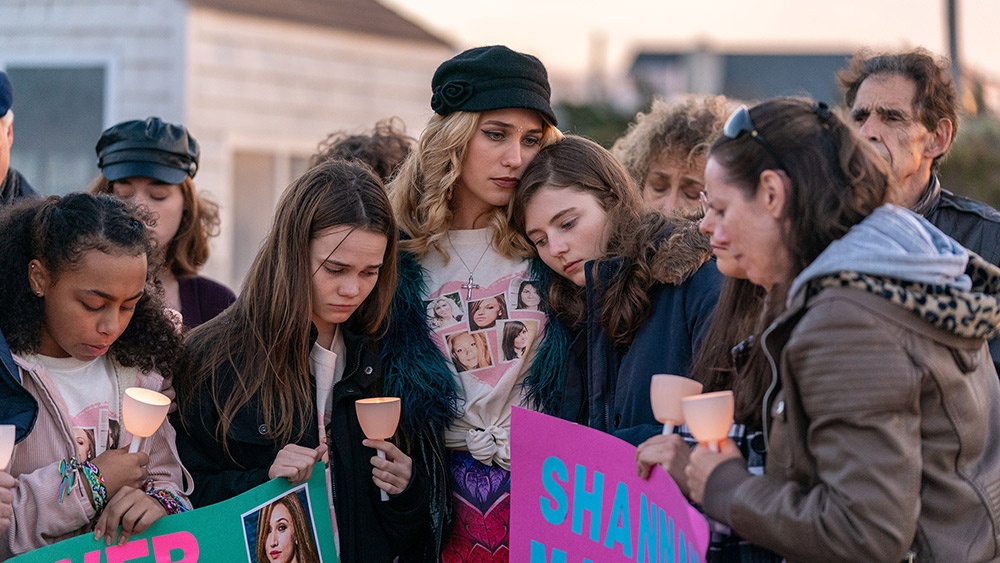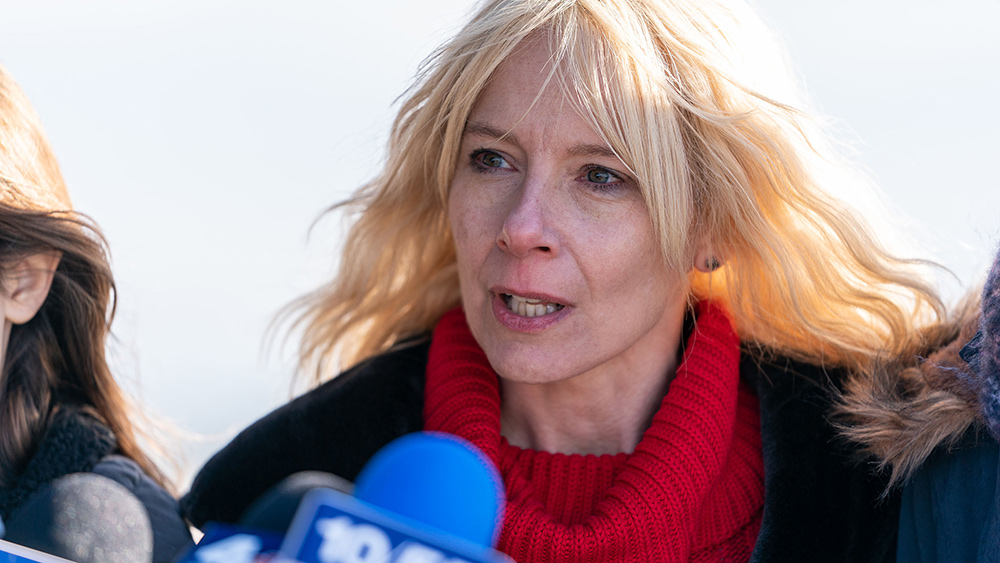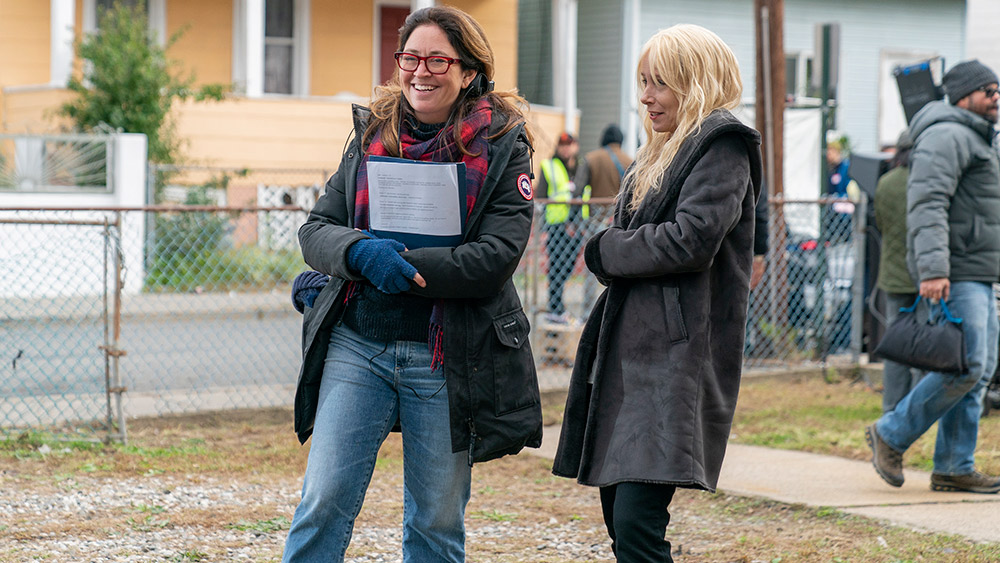
2010年,山南·吉尔伯特在纽约长岛失踪,警方在搜寻过程中发现了另外四具女尸,都装在粗麻袋里,被抛弃在吉尔戈海滩(Gilgo Beach)附近。但这并不是一起典型的失踪人口案件,执法部门一开始并不认为有任何疑点,因为吉尔伯特是一名性工作者。尽管山南在恐惧中从客户家里逃了出来还打了911报警,但她的母亲玛丽仍然需要不断给警方施压,让他们认为事情不对劲。
玛丽和其他受害者的家人仍然在进行漫长而艰难的斗争,试图让警方和公众对这些案件予以关注,利兹·加布斯在奈飞(Netflix)的新电影《失踪女孩》(Lost Girls)中讲述了这场斗争,该电影改编自罗伯特·科尔克2013年的同名小说。电影中艾米•瑞恩饰演玛丽,她为正义而战,同时还要努力打两份工,看护患有精神疾病的小女儿萨拉,人们绝不会把她看作一个让孩子沦为妓女的失败母亲。该剧联合主演包括托马辛·麦肯齐、罗拉·柯克以及饰演萨福克郡警察局长理查德·多默尔的加布里埃尔·伯恩。
这是加布斯在拍摄了《发生了什么,西蒙小姐?》(What Happened, Miss Simone?)、《第四等级》(The Fourth Estate)和《鲍比·菲舍尔对抗世界》(Bobby Fischer Against the World)等备受赞誉的纪录片之后,首次拍摄有剧本的电影。像其他电影一样,《失踪女孩》只讲述了故事的一部分:除了演职人员名单前的一张字幕,影片故事没有讲,玛丽在萨拉一次精神病发作中被刺死;尽管一名独立验尸官说山南可能是被勒死的,她的死仍未被定性为谋杀。
影片周五在奈飞首映,在此之前,《财富》杂志对话加布斯,探讨为什么这个故事更适合改编成电影,共同纪念玛丽,以及她希望观众从这个或许和长岛其他谋杀案有关的悬案中能有何收获?
为了表述清楚,有关对话进行了编辑和缩减。
在拍摄这部电影时,你有没有和受害者的家人谈过?
是的,我很幸运地在玛丽·吉尔伯特去世前见到了她,之后我还见到了电影中描绘的许多家庭成员。你会在电影中看到,玛丽了解媒体的力量,她知道故事的传播非常重要。她认为这部电影能再次引起人们对此案、对她渴望正义之心的关注。电影很难面面俱到地讲述每一个家庭成员,但与此同时,他们都很感激电影引起人们对这起案子的关注,感激电影让他们成为立体的人。

是什么让你想把这个故事改编成戏剧而不是纪录片?
关于这个案子已经有一些优秀纪录片了,比如美国线业公司(A&E)播放的《杀戮季》(The Killing Season),我觉得没什么可再补充的了。这个剧本的新颖之处在于它是连环杀手电影的另一面,人们没看到的一面——讲的是受害者家庭为了正义斗争,而非警察的工作程序。
这不是一部典型的犯罪电影,制作这部电影的过程是怎么样的?
真实犯罪题材电影的观众群体非常庞大,但电影公司制作的电影收入主要来源是演员票房,而其中男演员的票房收入更加有力。奈飞这样的网站并不采用这种模式,因此你在讲故事时可以按照自身意愿自主选择演员,无需让故事围绕一个男性中心人物展开。
没错。你得让加布里埃尔·伯恩的角色参与感更强。
是的,或者说更核心。但是,这不是他的故事。这是玛丽·吉尔伯特的故事。
拍摄这部电影时,调查仍在进行中,这是种什么感觉?
如果能知道凶手是谁,我们会非常非常非常高兴。(编剧)迈克尔·沃伊总是说:“不管最终查明谁是罪魁祸首,我希望剧本能让人感觉真实、诚实、准确。”
但事实是,故事还没有结束。我们还没有找到凶手,而且对于那些家庭来说,漠视还在继续。今天早上,我收到了其中一个受害者家人的短信,告诉我他们十分难过,因为当地要在发现自己亲人尸体的位置铺一条自行车道。这些年轻的生命逝去了,我们应该尊重他们,为他们伸张正义。

最后,你希望人们能从电影中得到什么?
希望人们能讨论这个案子,让它继续活跃,在网上传播,不要让这个案子消失。我们知道,因为这些家庭的持续施压,这些案件可以得到解决。金州杀手案刚刚告破,相关罪案都发生在70年代。我们希望人们能伸张正义,同时拒绝以剥夺人性的方式对人们进行归类。我经常想,如果不是称之为“失踪的妓女山南·吉尔伯特”而是“失踪的学生山南·吉尔伯特”或“失踪的女儿”,事情的进展会如何——仅仅是我们描述人的方式,就把责任推给了他们,而抹去我们的责任。
电影预告片发布当天,萨福克郡警方召开了多年来的首次新闻发布会。这是个奇怪的巧合,但是他们提出了一条新的证据,那个皮带扣。越多人谈论这个案子,就会有越多人关注这个皮带扣,也许会有人知道些什么。广泛传播这些信息是关键所在。(财富中文网)
译者:Agatha
2010年,山南·吉尔伯特在纽约长岛失踪,警方在搜寻过程中发现了另外四具女尸,都装在粗麻袋里,被抛弃在吉尔戈海滩(Gilgo Beach)附近。但这并不是一起典型的失踪人口案件,执法部门一开始并不认为有任何疑点,因为吉尔伯特是一名性工作者。尽管山南在恐惧中从客户家里逃了出来还打了911报警,但她的母亲玛丽仍然需要不断给警方施压,让他们认为事情不对劲。
玛丽和其他受害者的家人仍然在进行漫长而艰难的斗争,试图让警方和公众对这些案件予以关注,利兹·加布斯在奈飞(Netflix)的新电影《失踪女孩》(Lost Girls)中讲述了这场斗争,该电影改编自罗伯特·科尔克2013年的同名小说。电影中艾米•瑞恩饰演玛丽,她为正义而战,同时还要努力打两份工,看护患有精神疾病的小女儿萨拉,人们绝不会把她看作一个让孩子沦为妓女的失败母亲。该剧联合主演包括托马辛·麦肯齐、罗拉·柯克以及饰演萨福克郡警察局长理查德·多默尔的加布里埃尔·伯恩。
这是加布斯在拍摄了《发生了什么,西蒙小姐?》(What Happened, Miss Simone?)、《第四等级》(The Fourth Estate)和《鲍比·菲舍尔对抗世界》(Bobby Fischer Against the World)等备受赞誉的纪录片之后,首次拍摄有剧本的电影。像其他电影一样,《失踪女孩》只讲述了故事的一部分:除了演职人员名单前的一张字幕,影片故事没有讲,玛丽在萨拉一次精神病发作中被刺死;尽管一名独立验尸官说山南可能是被勒死的,她的死仍未被定性为谋杀。
影片周五在奈飞首映,在此之前,《财富》杂志对话加布斯,探讨为什么这个故事更适合改编成电影,共同纪念玛丽,以及她希望观众从这个或许和长岛其他谋杀案有关的悬案中能有何收获?
为了表述清楚,有关对话进行了编辑和缩减。
在拍摄这部电影时,你有没有和受害者的家人谈过?
是的,我很幸运地在玛丽·吉尔伯特去世前见到了她,之后我还见到了电影中描绘的许多家庭成员。你会在电影中看到,玛丽了解媒体的力量,她知道故事的传播非常重要。她认为这部电影能再次引起人们对此案、对她渴望正义之心的关注。电影很难面面俱到地讲述每一个家庭成员,但与此同时,他们都很感激电影引起人们对这起案子的关注,感激电影让他们成为立体的人。
是什么让你想把这个故事改编成戏剧而不是纪录片?
关于这个案子已经有一些优秀纪录片了,比如美国线业公司(A&E)播放的《杀戮季》(The Killing Season),我觉得没什么可再补充的了。这个剧本的新颖之处在于它是连环杀手电影的另一面,人们没看到的一面——讲的是受害者家庭为了正义斗争,而非警察的工作程序。
这不是一部典型的犯罪电影,制作这部电影的过程是怎么样的?
真实犯罪题材电影的观众群体非常庞大,但电影公司制作的电影收入主要来源是演员票房,而其中男演员的票房收入更加有力。奈飞这样的网站并不采用这种模式,因此你在讲故事时可以按照自身意愿自主选择演员,无需让故事围绕一个男性中心人物展开。
没错。你得让加布里埃尔·伯恩的角色参与感更强。
是的,或者说更核心。但是,这不是他的故事。这是玛丽·吉尔伯特的故事。
拍摄这部电影时,调查仍在进行中,这是种什么感觉?
如果能知道凶手是谁,我们会非常非常非常高兴。(编剧)迈克尔·沃伊总是说:“不管最终查明谁是罪魁祸首,我希望剧本能让人感觉真实、诚实、准确。”
但事实是,故事还没有结束。我们还没有找到凶手,而且对于那些家庭来说,漠视还在继续。今天早上,我收到了其中一个受害者家人的短信,告诉我他们十分难过,因为当地要在发现自己亲人尸体的位置铺一条自行车道。这些年轻的生命逝去了,我们应该尊重他们,为他们伸张正义。
最后,你希望人们能从电影中得到什么?
希望人们能讨论这个案子,让它继续活跃,在网上传播,不要让这个案子消失。我们知道,因为这些家庭的持续施压,这些案件可以得到解决。金州杀手案刚刚告破,相关罪案都发生在70年代。我们希望人们能伸张正义,同时拒绝以剥夺人性的方式对人们进行归类。我经常想,如果不是称之为“失踪的妓女山南·吉尔伯特”而是“失踪的学生山南·吉尔伯特”或“失踪的女儿”,事情的进展会如何——仅仅是我们描述人的方式,就把责任推给了他们,而抹去我们的责任。
电影预告片发布当天,萨福克郡警方召开了多年来的首次新闻发布会。这是个奇怪的巧合,但是他们提出了一条新的证据,那个皮带扣。越多人谈论这个案子,就会有越多人关注这个皮带扣,也许会有人知道些什么。广泛传播这些信息是关键所在。(财富中文网)
译者:Agatha
When Shannan Gilbert disappeared on Long Island, N.Y., in 2010, the search for her led to police discovering the bodies of four other women, all left near Gilgo Beach in burlap sacks. But it wasn’t a typical missing person case—law enforcement initially didn’t find it suspicious, because Gilbert was a sex worker. It took constant pressure from her mother, Mari, for the police to consider that anything was amiss, even though Shannan had called 911 after fleeing a client’s house in a panic.
Mari and the families of the other victims still faced an uphill battle in getting the police and the public to care about the cases, a struggle that’s conveyed in Liz Garbus’s new Netflix movie, Lost Girls, which is based on Robert Kolker’s 2013 book of the same name. It stars Amy Ryan as Mari, who fights for justice while struggling to work two jobs, manage her youngest daughter Sarra’s mental illness, and be seen as anything but a failed mother who let her child fall into prostitution. It costars Thomasin McKenzie, Lola Kirke, and Gabriel Byrne as Suffolk County police commissioner Richard Dormer.
This is Garbus’s first scripted feature after her many acclaimed documentaries including What Happened, Miss Simone?, The Fourth Estate, and Bobby Fischer Against the World. Like those movies, Lost Girls tells only part of the story: outside of a pre-credits title card, it doesn’t include the fact that Mari was fatally stabbed by Sarra during a schizophrenic episode and that Shannan’s death is still not considered a murder despite an independent coroner saying it was likely she was strangled.
Before the movie’s streaming debut on Friday, Fortune spoke with Garbus about why this story was better suited to a dramatic adaptation, honoring the memory of Mari, and what she hopes viewers will take away about this still-unsolved case—which might be connected to a number of other Long Island murders.
This conversation has been edited and condensed for clarity.
While working on the movie, did you talk with any of the victims’ family members?
Yeah, I was fortunate to meet Mari Gilbert before she passed, and I have since met many of the family members depicted in the film. As you can see in the film, Mari understood the power of the media and that it was incredibly important to get the story out. She saw this as another point of attention for the case and her desire for justice. For many of the family members, I think it’s hard to have it all out there, but at the same time, they appreciate the attention it brought to the case and the way in which it made them three-dimensional human beings.
What was it about this story that made you want to do it as a dramatic adaptation as opposed to a documentary?
There have been some great documentaries done on this case like The Killing Season on A&E, so I didn’t feel that I had something to add in that regard. What was new about this script was it was the flip side of the serial killer movie, the side that’s not told—the struggles of the families left grasping for justice as opposed to the procedural work of the police.
What was the process of getting the project made like, given that it’s not a typical crime movie?
There is a really strong audience for the true-crime genre of moviemaking, but studio movies are typically financed around the box office numbers of their actors, and their male actors have much more solid box office numbers backing them. A place like Netflix is not working with that model, and it gives you the freedom to cast the way you want to and tell the story without making it be about a man at the center.
Right. You’d have to make Gabriel Byrne’s character more involved.
Yeah, or central. But, of course, it wasn’t his story. It was Mari Gilbert’s story.
What was it like filming this while the investigation is still happening?
Well, we would be very, very happy to know the killer. [Screenwriter] Michael Werwie always said, “I want the script to feel truthful and honest and correct, no matter who we end up finding is responsible.”
The truth is that the story is not over. We don’t have the killer, and also, for the families, the disregard continues. I got a text message this morning from one of the family members talking about how upset they were because they’re paving a bike lane over the spots where their loved ones were found. These young lives lost, we should be honoring them and finding justice for them.
In the end, what do you hope people take away from the film?
It’s to talk about this case and keep it alive and go online and spread the word and just not let it die. Because of these families, we know that, with continued pressure, these cases can be solved. The Golden State Killer case was just solved, and those crimes occurred back in the ’70s. We want people to demand justice and also to refuse to reduce people to a category that deprives them of their humanity. I often think of what it would have been like if instead of “missing prostitute Shannan Gilbert,” they’d said, “missing student Shannan Gilbert” or “missing daughter”—just how we describe people in order to somehow cast the blame on them and wipe our hands of responsibility.
The day that our trailer was released, the Suffolk County Police held their first press conference in years. It was a strange coincidence, but they put out this new piece of evidence, this belt buckle. The more people are talking about the case, the more eyes there will be on that belt buckle, and maybe somebody will know something. Getting that information out there widely is key.






